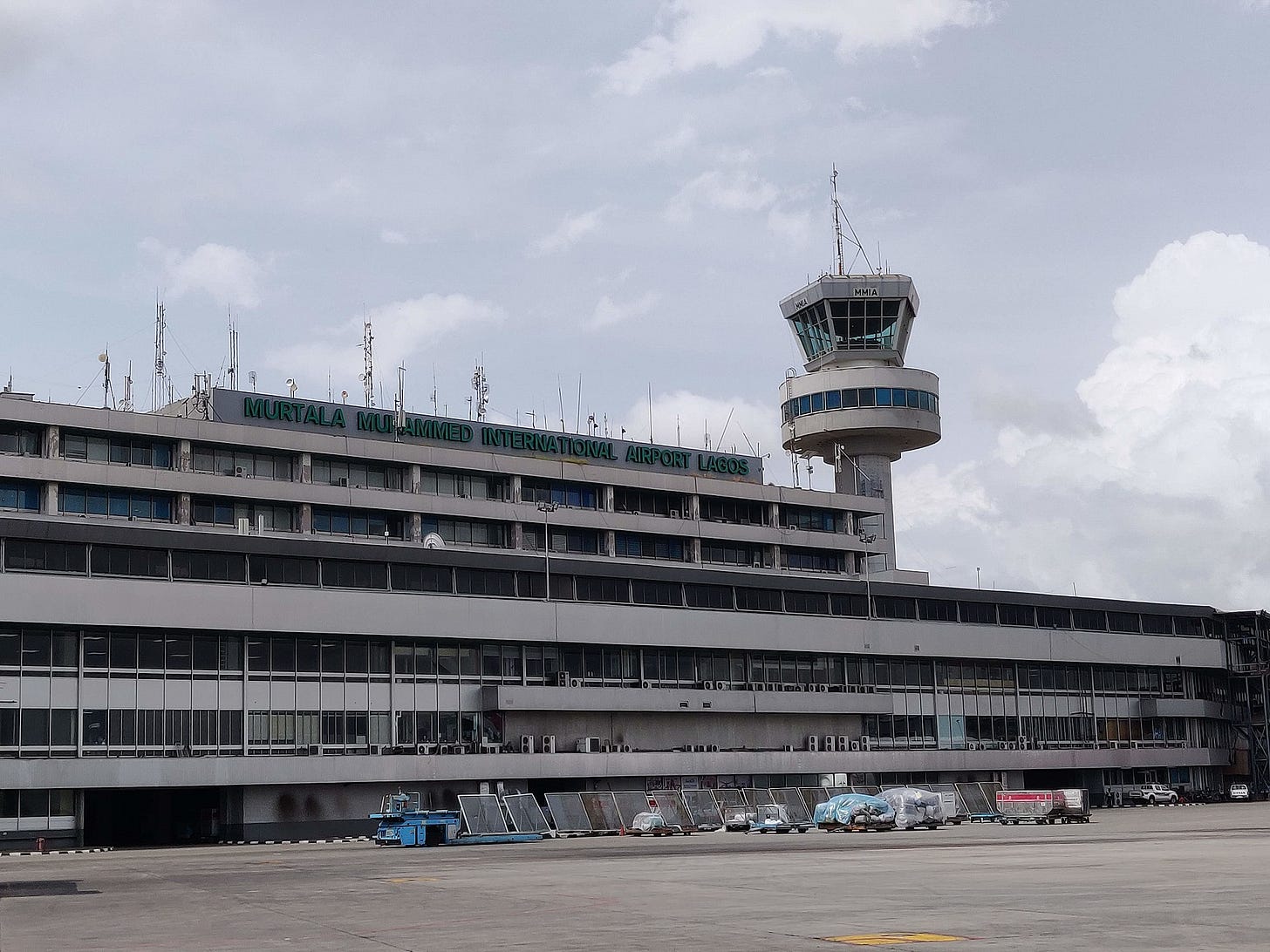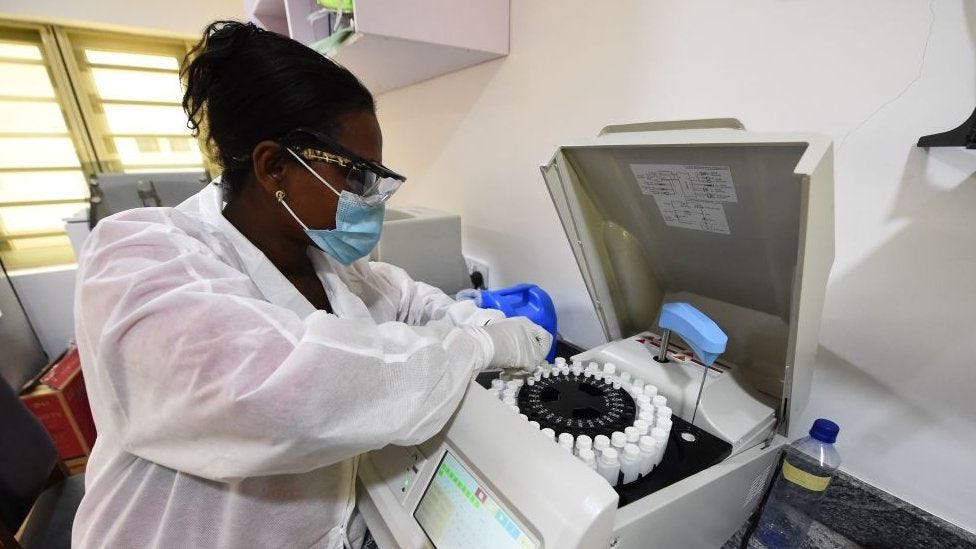Note
This week, we are excited to bring you a half-guest post: Loye Oyedotun and I (Fola) have written about the anticompetitive government policy underpinning Nigeria’s COVID-19 test prices.1
Loye is a corporate lawyer at Taylor Wessing, where he focuses on mergers and acquisitions and venture capital investments in the technology sector. Prior to this, he worked in Slaughter & May’s Corporate team. Loye and I also have a weekly podcast together on African politics and business news called, A Brief Listen. It is available on Spotify and Apple Podcasts, and it has an accompanying newsletter, theBrief, which is available on Substack.
As always, thank you for your support, and we hope you enjoy this week’s article.
COVID-19 testing
Living through a pandemic has meant that we have all had to become familiar with the various forms of COVID-19 testing. I (Fola) still remember when I first heard about how the COVID-19 test was done, and my immediate thought was: Surely not? Surely there has to be another way? Fast forward to now, and having done the COVID-19 test easily over 50 times, I can say I am somewhat of an expert at getting tested.
However, one aspect of COVID-19 tests has evaded my understanding: why are the tests still so expensive…?
Since Nigeria’s first case in March 2020, until May 2020, the Lagos State government managed to rack up a bill of N800 million on COVID-19 tests. And between September 2020 and June 2021, Nigerian air travellers spent N40 billion on COVID-19 tests. That is N4 billion per month. N1 billion per week. N142 million per day. Funds that could go into commerce and more generally grow the economy.
If you are landing in Lagos today, you’d have to cough up N45,250 for a mandatory Day 2 test. In other states, the test would set you back approx. N39,000 or less, depending on the state.

You might notice how odd it is that the prices are fixed within each state. No variation, no deviation, just homogeneity.
But that doesn’t need to be the case. In the United Kingdom, at the start of the pandemic, PCR tests were approx. £130 per test (N72,900), but now, not only can you do lateral flow tests—which are significantly cheaper—but the PCR tests themselves are significantly cheaper than before: you can get them for as low as £15 (N8,400).
As if that wasn’t enough, you can choose from a list of almost 400 government-approved test providers, depending on where you are. And these providers compete with each other on: speed (in how quickly they deliver the test to you, and in how quickly you get your result back), user experience, reliability, and most importantly, price. Because there are many providers, you, as the consumer, have more choice.
Contrast this with the lack of competition and the lack of differentiation in Nigeria.
To better understand where Nigeria missed the road, we spoke to people from COVID-19 test labs in Lagos to inquire into how their pricing works.

From these conversations, we understand that each PCR test costs somewhere between N5,000 and N7,000 (the labs bear this cost). The price varies from supplier to supplier (which are representatives of international companies—rather unsurprisingly, we do not make the test kits in Nigeria), and it depends on traditional supply and demand forces.
Naturally, you might ask: so, how do we get to N45,250? Well, each State government fixes the overall price. Then, they take their cut. And the remainder goes to the labs to cover their costs: overheads (such as, power, IT, logistics, internet, staff salary, etc.) and consumables (such as, PPEs: face masks, gloves, etc.).
According to one of our secret ‘sauces’, when it comes to profit, “...people think [labs] make a lot of money. But the bulk of [it] goes to the state government.” In fact, once Lagos state takes its cut and the lab’s costs are covered, labs only make approx. N9,000 per test (19.9%).
Other competition authorities have actually intervened in COVID-19 test pricing.
For instance, Competition Commission of South Africa (CCSA) went after three labs for charging extortionate prices for COVID-19 tests. After an investigation, the CCSA entered into agreements with three major labs—Pathcare, Ampath, and Lancet—to reduce the prices of PCR tests from R850 (N23,000), to no more than R500 (N13,000). The investigation also revealed a similar problem with rapid antigen tests, and the CCSA got the labs to reduce the prices of their rapid antigen tests from R350 (N9,400), to no more than R150 (N4,000).
Interestingly, the CCSA actually looked into how much the tests cost and used this to determine what amounts to an excessive price. For rapid antigen tests, which cost R50 (N1,000), the CCSA found that pricing above R150 would be excessive.
Put simply, in South Africa, insufficient competition led to higher prices and the CCSA intervened to lower them.
Similarly, in the United Kingdom, as mentioned above, there was a change in policy to allow more competition into the market, which has led to lower prices.
The United Kingdom has also used a more consumer protection approach, with the aim of providing consumers with more information, which ultimately improves competition: if people are better informed, they can make better decisions, and the process of competition will meritocratically favour companies that actually produce better quality products and at lower prices.
So, for instance, in an open letter to PCR test providers, the UK’s Competition & Markets Authority (CMA) expressed concerns about providers advertising up-front prices and excluding additional charges, and also advertising cheap tests that were only available in small quantities, among other things.
After this, in September last year, the CMA published a list of recommendations to the UK government—such as, consistent monitoring of prices and costs, better comparison on the GOV.UK website, and sanctioning government-approved providers that do not meet the prescribed standards.
The next few months saw the CMA intervene against PCR test providers—namely, Expert Medicals, Dante Labs, and Randox—who failed to, among other things, inform customers of their rights to cancellations, refunds, and compensation.
What these experiences in South Africa and the United Kingdom show is that competition can lead to better outcomes for consumers in the PCR testing market.
There are many ways we could reduce test prices in Nigeria. If we had self-testing or lateral flow tests, the prices would drop. Moreover, if the labs were willing to lose some profit to give us cheaper tests, the prices would drop even further, however that is not in their interests.

But, ultimately, we think the impact of these solutions would still be dwarfed by the underlying problem: the forces of competition are not allowed to operate in the sector because of government policy on how tests are priced.
So, then, the question we must ask is: how can we unlock competition in this space? And this is a question of competition policy, and not competition law.
Side note: Competition law is the actual legal regime—i.e., merger control, abuse of dominance, anticompetitive agreements. You can find this in the statute books.
Meanwhile, competition policy is everything and anything that a government does that (even remotely) affects the competitiveness of its markets—including, trade policy, tax laws, regulatory frameworks, intellectual property protection, foreign investment laws, access to finance, the ease (or otherwise) of registering a company, and of course, competition law.
Competition law is a tool within competition policy.
So, the more precise question we should ask is: how should we deal with problems of anticompetitive government policy? Simple answer: lobbying.
Kenya provides a good example.2 Kenya used to be the world’s producer of a pesticide that was extracted from pyrethrum flowers, until the Kenyan government passed a law creating a Pyrethrum Board that all farmers had to sell their produce to; sucking any forces of competition out of the market. What happened next? The Board delayed or underpaid the farmers, it was very inefficient, and many farmers abandoned the crop.


But, with the help of the World Bank, the Kenyan competition authority lobbied stakeholders and legislators, which resulted in the Board’s monopoly being repealed. And this allowed the forces of competition to dictate price and output, which improved the incomes of over 40,000 Kenyan farmers. It impacted lives positively.
Kenya lobbied for government policy to be more ‘pro-competition’,3 so that it could unlock competition in a sector and deliver better outcomes for consumers. And it is this approach that must be applied to PCR testing in Nigeria.
Before you go…
…here are some recent developments in the world of competition law:
Collusion in South Africa: The CCSA has made a referral to the Competition Tribunal to prosecute vehicle finance institutions for collusion. FirstRand Bank, Wesbank, and Toyota Financial Services, have been listed in the referral. What did they do wrong? They entered into an agreement which included non-compete clauses: e.g., Wesbank was prohibited from offering finance to consumers that purchased vehicles from authorised Toyota dealerships. Why is that bad? Because it denies consumers the opportunity to choose between different finance providers; meaning that, the providers are under less pressure to offer better rates.
Zambian 2021 review: The Zambian Competition and Consumer Protection Commission (CCPC) has published its 2021 review, and there are some interesting things to note about its enforcement activity. On the consumer protection front, the CCPC resolved 2,366 out of 2,933 cases; recovering $133,000 in refunds. The CCPC had 19 abuse of dominance investigations and closed 11. And it conducted 5 dawn raids on suspected cartels; handling a total of 16 cartel cases.
Soft drinks in Tanzania: Prices of soft drinks in Tanzania have been on the rise since October 2021, and according to a report from the Fair Commission Commission, this is due to scarcity caused by a lack of containers for transporting industrial sugars. Many traders have taken advantage of this scarcity by hiking their prices. But this week, the Tanzanian government, through the Minister of Investment, Industry, and Trade, has warned against such price hiking.
This is actually our second article together on competition law. You can read the first one, from 2019, here: What’s The Deal with: Bank Charges aka Cartel 101.
See Eleanor Fox and Mor Bakhoum, Making Markets Work for Africa (Oxford University Press, 2019) pages 5-6, and 67.
Zambia is another example: their competition authority lobbied for changes in the car towing sector to prevent the police from assigning towing jobs to a select group of companies (who were charging extortionate fees) and to also encourage new entrants into the market. Over time, prices dropped significantly.
Id. at page 81. For more, see this article in the Lusaka Times: CCPC opens probe into vehicle towing business at scenes of accidents.




